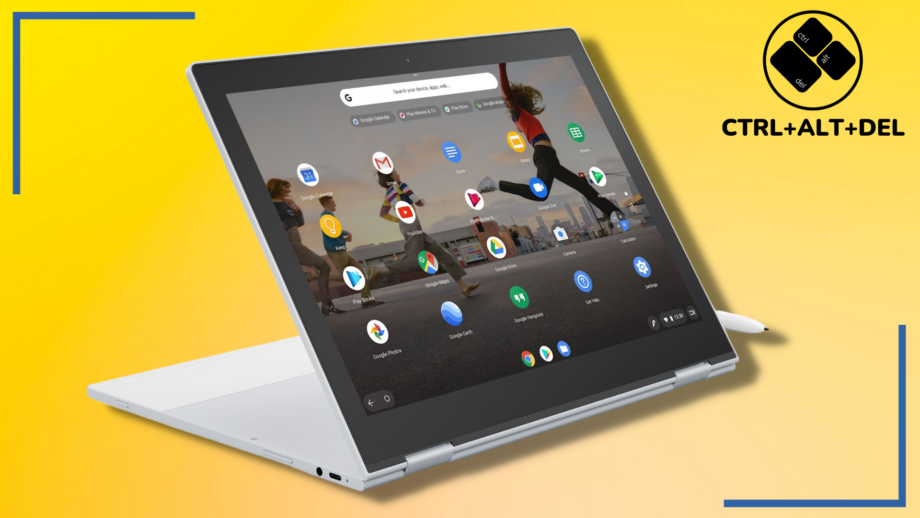Ctrl+Alt+Del: Chromebooks need a rethink, not a rebrand

OPINION: Rumours have been floating around surrounding ‘Chromebook X’, a new label that will clearly indicate high-end Chromebooks from their budget siblings. But as it currently stands, this doesn’t seem like anything more than a change of branding, with no focus on actually improving Chromebook hardware.
The spotlight is on Google this week, with rumours flying around about a brand new verification system for its Chromebook line of laptops. Seen first on 9to5Google, the report claims that Google will be introducing ‘Chromebook X’ as a label for high-end Chromebooks. It’s worth noting out of the gate that this is all currently speculation, with no confirmation from Google on the validity of these claims.
Putting aside the idea that this could all be wishful thinking, I wanted to take a closer look at the idea of bringing in a Chromebook X label.

Galaxy S22 with a free Chromebook
We’ve come across this incredible 250GB contract for the Galaxy S22 which also nabs you a Galaxy Chromebook 4 for absolutely no extra cost.
- Mobiles.co.uk
- £40 upfront
- £34/month
For starters, it’s very reminiscent of Intel Evo. For a more detailed explanation check out our Intel Evo explainer, but in a nutshell, Intel Evo is a high badge of honour awarded to Intel-powered machines that hit a specific set of criteria. This includes battery life, Wi-Fi 6E support, fast charging and more. It’s a very easy way for consumers to identify capable laptops without needing to know all the computer jargon that usually goes along with that.
But Chromebook X isn’t doing what Intel Evo does, at least not in the same way. 9to5Google claims that Chromebook X laptops will have to hit some criteria. The most notable of these is the processor requirements. Chromebook X devices will need to include either an AMD Zen 2+ (Skyrim), AMD Zen 3 (Guybrush) or Intel Core 12th Gen (Brya and Nissa).
Those specs look perfectly reasonable, until you realise that the so-called Nissa line represents Intel’s N-Series chips, which are well-known for their affordability and typically feature in laptops that are under £400/$400.
This means that, unlike Intel Evo, Chromebook X is not singling out the best of the best. Google would be setting a low bar by allowing verification for Chromebooks with the limitations of an outdated or underpowered processor. Sure, not everyone needs a juggernaut laptop, but it feels a tad misleading to label them as an “above average” Chromebook when that isn’t reflected by the specs. This feels more like an exercise in rebranding than any attempt to actually improve the hardware.
Of course, Chromebooks can be powerful devices. The HP Dragonfly Pro Chromebook (2023) comes with an Intel Core 12th Gen processor, which provided fantastic performance in our testing – at least for a Chromebook. But as our tests show, it can’t hold up against many of its Windows rivals. And the $999 price tag is well out of range of what most Chromebooks cost, which is one of the main selling points of these laptops over Windows and Mac devices.
No matter what label you stick onto a Chromebook, it has its limitations. That’s not to say that you should never consider trying out a Chromebook, but I get the impression that the new Chromebook X moniker is an attempt to mitigate the slow advancement of hardware and instead rebrand what’s already on the market.
Adding a Chromebook X sticker is not going to solve Google’s Chromebook problem. If Google wants people to move on from the idea that Chromebooks are all just browser-in-a-box machines, then it needs to start upgrading the hardware where it counts. I’d love to see a new PixelBook that leads the charge.
And if not, then start selling Chromebooks on what they’re good at; simple browsing, easy navigation and (usually) a very affordable asking price. It seems like Google is trying to have its cake and eat it too, with newfound terms that are simply putting a fresh coat of paint on what we’re already familiar with.
Ctrl+Alt+Delete is our weekly computing-focused opinion column where we delve deeper into the world of computers, laptops, components, peripherals and more. Find it on Trusted Reviews every Saturday afternoon.








